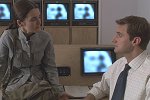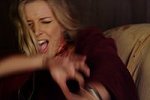 SHADOWS ARTHOUSE FILMS ’04
SHADOWS ARTHOUSE FILMS ’04On this page: 5X2 | FROZEN | MONDOVINO | KOKTEBEL | TOOLBOX MURDERS
< < M O R E | M O R E > >
More mainstream art films have their own pages.
Other offbeat films are at: SHADOWS FILM FESTIVAL | SHORT FILMS
last update
19.Oct.04
 5X2 FIVE TIMES TWO [Cinq Fois Deux]
5X2 FIVE TIMES TWO [Cinq Fois Deux]


|
dir-scr Francois Ozon with Valeria Bruni-Tedeschi, Stephane Freiss, Geraldine Pailhas, Francoise Fabian, Michael Lonsdale, Antoine Chappey, Marc Ruchmann, Jason Tavassoli, Jean-Pol Brissart release France 1.Sep.04, UK 18.Mar.05, US 10.Jun.05 • 04/France 1h30  REVIEW BY RICH CLINE |
We open with the divorce pronouncement and a final sexual liaison between Marion and Gilles (Bruni-Tedeschi and Freiss)--a difficult confrontation filled with regret and passion. Moving back a few years we're at a strained dinner party with Gilles' brother (Chappey) and his young boyfriend (Ruchmann). Earlier we visit them on the strange day their son is born, on their joyous wedding day and on the holiday where they met. At each stage we see the blend of light/shadow and past/present that make up every relationship.
From the melancholy opening, Ozon sets an introspective tone that draws us in. The characters don't say much, and when they do there's a strong subtext that lets us see inside them. Despite the undercurrent of sadness, Ozon manages to inject a strong sense of hope, as well as a reminder that even if a relationship ends in pain, the earlier happiness was still real. And worth remembering.
 Bruni-Tedeschi and Freiss have strong chemistry that makes the relationship believable and helps us identify with them at each stage. These are complex people, likable and deeply flawed--their interactions with each other and with others are extremely telling (including Fabian and Lonsdale as Marion's parents, Pailhas as Gilles' ex, and Tavassoli as a mysterious American). And since they play each scene with such subtlety, we are constantly revising what appears to be happening based on new information we get later.
Bruni-Tedeschi and Freiss have strong chemistry that makes the relationship believable and helps us identify with them at each stage. These are complex people, likable and deeply flawed--their interactions with each other and with others are extremely telling (including Fabian and Lonsdale as Marion's parents, Pailhas as Gilles' ex, and Tavassoli as a mysterious American). And since they play each scene with such subtlety, we are constantly revising what appears to be happening based on new information we get later.
With characters this strong, Ozon is free to make a film that feels both authentic and slightly gimmicky. As it progresses, we begin to understand these people without getting a movie-like explanation of why their marriage falls apart. There are moments that are powerfully passionate and sexy, achingly awkward, quietly intimate, and disturbing and sympathetic at the same time. In each scene, both characters do things that are tender and cruel, which is so like real life that it's almost hard to watch. [15 themes, language, sex, nudity] 15.Oct.04 lff
 FROZEN
FROZEN


|
dir Juliet McKoen • scr Juliet McKoen, Jayne Steel with Shirley Henderson, Roshan Seth, Jamie Sives, Richard Armitage, Sean Harris, Ger Ryan, George Costigan, Ralf Little, Rebecca Palmer, Shireen Shah, Karl Johnson, Natalie Henderson release UK 27.Jan.06 • 04/UK 1h30  REVIEW BY RICH CLINE |
Kath (Henderson) is a disturbed young woman obsessed with the mysterious disappearance of her sister. She's become depressed to the point of suicide, and is now seeing her local priest (Seth) for counselling, while never giving up her search into what happened. Then she stumbles onto a clue in the form of a security videotape, which encourages her to look further, even as everyone around her has given up hope.
Henderson is such an engaging and gifted actress that we can't take our eyes off her. After a string of silly comedies, it's nice to see her in a serious, somewhat sexy role for a change. And her minute physicality fits perfectly with the little-girl-lost tone of the character. She's so real it's almost frightening--we really worry for her--and the rest of the cast bring their characters to life in extremely believable ways.
 Meanwhile, McKoen captures it with a real eye for beauty--each frame looks like a work of art, using the coastline as another character in the story. She does rather overdo the title metaphor--from Kath's frozen state waiting for the truth to lots of ice, frozen fish, freeze frames and so on. But as the mystery deepens, McKeon draws us in, revealing the characters slowly enough that we never get ahead of Kath in her quest and adding an ethereal parallel layer in Kath's fantasies.
Meanwhile, McKoen captures it with a real eye for beauty--each frame looks like a work of art, using the coastline as another character in the story. She does rather overdo the title metaphor--from Kath's frozen state waiting for the truth to lots of ice, frozen fish, freeze frames and so on. But as the mystery deepens, McKeon draws us in, revealing the characters slowly enough that we never get ahead of Kath in her quest and adding an ethereal parallel layer in Kath's fantasies.
A distracting romantic subplot doesn't work quite as well, and when the thriller really kicks in there are several rather gaping holes in the plot (the police station is closed? Dial 999!). The film also has such an overwhelmingly sad tone that we never even suspect it might end happily. I won't say what happens, beyond a few interesting and unsuspected turns in the tale. Nothing terribly original, but the quietly effective directing and acting help make it worthwhile. [12 themes, language, violence] 18.Oct.04 lff
 KOKTEBEL [aka: Roads to Koktebel]
KOKTEBEL [aka: Roads to Koktebel]


|
dir-scr Boris Khlebnikov, Aleksei Popogrebsky with Igor Chernevich, Gleb Puskepalis, Agrippina Steklova, Vladimir Kucherenko, Alexander Ilyin, Evgenyi Sytyi release Russia 25.Sep.03, UK 31.Dec.04 • 03/Russia 1h45  REVIEW BY RICH CLINE |
After his wife dies and he loses his job, a man (Chernevich) and his 11-year-old son (Puskepalis) must travel by foot south through Ukraine to Koktebel in Crimea, where his sister lives. Hitching rides on trains, walking across the countryside, they meet people who are helpful for the most part ... and sometimes rather scary. As they progress it becomes clear that the son has the more forceful and determined personality. And when Dad gets distracted by vodka and a woman (Steklova), the boy decides to do something about it.
The writer-directors craft their film extremely carefully, keeping dialog to a bare minimum and framing each shot like a painting, even though the landscapes are about as bleak as they can be. Much of the cinematography is straight-on and static, and then there is a strangely angled shot that takes the breath away with its subtle insight. And in the characters they capture something of the heart of the post-Soviet world--shattered people who have a yearning to share their experience with someone else. The flashes of warmth among them are a strong contrast to the seriously foreboding countryside the man and boy are crossing.
In their state of desperation, you worry along with the father that anything can happen at any time. The son, though, is so single-minded that it's a bit frightening! Each stage in their journey is loaded with meaning and poetry that are probably lost on most Western audiences. But there's so much here to grab hold of that it's a magical thing to watch. We travel every step with them, every person we see could be a saviour or a villain, their destination seems unreachable sometimes, and we can feel the boy's tenacity to get there. As well as the man's chance for something better than he ever imagined he'd find. [12 themes, violence, language] 8.Oct.04
 MONDOVINO
MONDOVINO


|
dir Jonathan Nossiter with Michel Rolland, Robert Parker, Robert Mondavi, Hubert de Montille, Vittorio Frescobaldi, Piero Antinori, Aime Guibert, Arnaldo Etchart, James Suckling, Michael Broadbent, Antonio Cabezas, Salvatore Ferragamo release UK 10.Dec.04, US 25.Mar.05 • 04/US 2h18  REVIEW BY RICH CLINE |
Nossiter is examining the top of the wine business, the pricey shelves most of us mere mortals never reach. The problem is that none of them are made using old world methods--they stir in a bit of modern technology to improve the terroir (the taste of the land) and make the wine drinkable more immediately in this busy era when we don't want to wait 30 years. Which all seems to defeat the point really!
The topic is fascinating, and Nossiter really digs into it, interviewing movers and shakers from France (de Montille and Guilbert) to Italy (Frescobaldi and Antinori) to California (the world-dominating Mondavi family) to Argentina (Etchart). And he also talks to the consultants (Rolland), critics (Parker and Suckling) and importers (Broadbent). There are a lot more people than I've named here, although he strangely ignores Australia and New Zealand completely. And all the talking heads leave us somewhat bored.
Fortunately there are several mini-dramas: big conglomerates taking over smaller family farms, duelling ideologies, bright young upstarts, a battle for a village in France, a thousand-year-old name in Italy, and so on. And Nossiter also seems to have an obsession with dogs, which helps liven things up. While interviewing people, his hand-held camera roams around looking for a friendly pooch to flirt with--and everybody has one!
The idea that the world is shifting from family control to multinational corporations is not limited to the wine industry, but it's certainly demonstrated vividly here. While this theme are interesting, it's also conveyed quickly. Perhaps in a 10-hour TV series Nossiter can get deeper into each aspect of the business, but his approach here feels rambling and repetitive. And while several people lament the loss of nature, dignity and tradition, we also know the world can never spin backwards. And no middle-ground solutions to the situations are ever explored. [PG themes, very brief nudity] 6.Oct.04
 TOOLBOX MURDERS
TOOLBOX MURDERS

|
dir Tobe Hooper • scr Jace Anderson, Adam Gierasch with Angela Bettis, Brent Roam, Juliet Landau, Sara Downing, Adam Gierasch, Greg Travis, Rance Howard, Adam Weisman, Marco Rodriguez, Chris Doyle, Sheri Moon, Stone Price Carson release US 10.Apr.04, UK 12.Nov.04 • 04/US 1h35  REVIEW BY RICH CLINE |
Nell and Steven (Bettis and Roam) move into the grand and slightly crumbling Lusman Arms building in Los Angeles and quickly notice how paper-thin the walls are. But they overhear more than arguments and sex; soon Nell becomes convinced something nefarious is going on. Sure enough, we know a shadowy figure is killing tenants one by one, using a variety of tools in revoltingly original ways. Is he the chatty building manager (Travis), creepy handyman (Gierasch), muttering old man (Howard), voyeuristic teen (Weisman) ... or maybe something much worse!
 They don't make nearly enough silly horror movies. And Hooper should know--he's made some great ones (including Poltergeist and the original Texas Chainsaw Massacre). This amusingly creepy B-movie is loaded with goofy characters and even the setting itself defies all laws of physics. The no-budget approach gives the film a gritty feel that makes all of Hooper's red herrings and sinister suggestions work wonderfully, especially as he plays with both L.A. history and horror film cliches.
They don't make nearly enough silly horror movies. And Hooper should know--he's made some great ones (including Poltergeist and the original Texas Chainsaw Massacre). This amusingly creepy B-movie is loaded with goofy characters and even the setting itself defies all laws of physics. The no-budget approach gives the film a gritty feel that makes all of Hooper's red herrings and sinister suggestions work wonderfully, especially as he plays with both L.A. history and horror film cliches.
Strange noises, flickering lights, secret passageways, hapless girls, freaky symbols, Hollywood jokes--they're all here! And the actors all do the B-movie thing perfectly, looking shifty and helpless at the same time. At the centre, Bettis is surprisingly good--a strong, independent woman who still, for some reason, stays home all day and tries to solve the mystery all by herself. Her journey through the story is actually quite terrifying.
And Hooper makes sure the film features a very high gore factor, cutting away so we don't see the really grisly stuff (and so he doesn't have to pay for expensive make-up effects), but vividly letting us imagine the killer's inventiveness. And as it escalates, he piles on the sudden, horrific killings, stacks of bodies and even hilariously nutty back-stories to explain everything. It's really, really bad. But in a very entertaining way. [15 themes, language, violence, gore] 7.Oct.04
